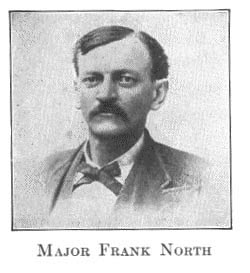Minnie Freeman Penney was a young schoolteacher who during the blizzard of 1888 led her pupils from their Valley County school to the shelter of a neighboring farmhouse. A collection of Nebraska pioneer reminiscences published in 1916 by the Nebraska chapter of the DAR includes both her memory of this storm-and an account of an earlier one in 1871 taken from her father’s diary. This earlier blizzard befell a party of buffalo hunters under the direction of Major Frank North that had started on a hunt with six wagon teams and four buffalo horses on November 13, 1871.
“The other men were Luther North, C. Stanley, Hopkins Brown, Charles Freeman, W. E. Freeman, W. E. Freeman, Jr., and Messrs. Bonesteel, Wasson, and Cook. They camped the first night at James Cushing’s ranch, eighteen miles out; the second night at Jason Parker’s home at Lone Tree, now Central City, and the third night arrived at Grand Island.”
After leaving Grand Island, the party crossed the Platte River and “camped on the West Blue. . . . About midnight the wind changed to the north, bringing rain and sleet, and inside of an hour a blizzard was raging on the open prairie. The horses were covered with snow and ice and there was no fuel for the fires. The men went out as far as they dared to go for wood, being unsuccessful. It was decided to try to follow the Indian trail south-made by the Pawnee scouts under Major North. Little progress could be made and they soon ‘struck camp’ near some willows that afforded a little protection to their horses and a ‘windbreak’ was made for man and beast. This camp was at the head of the Big Sandy, . . .
“For two days the storm continued in all its terrible force. The wind blew and the air was so full of snow that it was blinding. The cold was intense. The men finally determined to find some habitation at any price and in groups of two and three left camp following the creek where they were sure some one had settled. A sod house was found occupied by two English families who received the party most hospitably. Charles Freeman, older than the other men of the party, suffered a collapse and remained at this home.
“During the night the storm abated and next morning, finding all the ravines choked with heavy snow drifts, it was decided by vote to abandon the hunt. They dug out their belongings from under many feet of snow, sold their corn to the English families to lighten their load and started back. The journey home was full of accidents, bad roads, and drifted ravines. Reaching the Union Pacific railroad at Grand Island Major North and Mr. Bonesteel returned to Columbus by rail, also Mr. Stanley from Lone Tree. The rest of the party returned by team, arriving on November 24.
“Major North admitted that of all his experiences on the prairie-not excepting his years with the Pawnee scouts-this ‘beat them all’ as hazardous and perplexing.”
From Addison E. Sheldon’s History and Stories of Nebraska (1914).




